The women smashing Ethiopia's glass ceiling
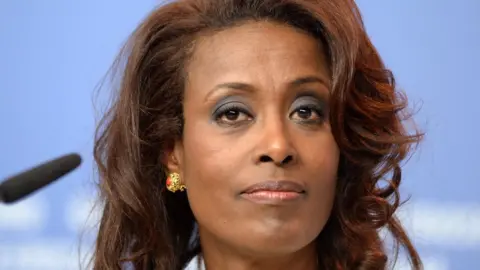 ullstein bild
ullstein bildEthiopia is changing rapidly under Prime Minister Abiy Ahmed, with women now wielding enormous power in a country where they have mostly been confined to traditional roles, writes BBC Tigrinya's Hana Zeratsyon.
Ethiopians like to say they were ruled by Queen Sheba in biblical times - something they take great pride in, yet the reality is that the Horn of Africa state is a deeply male-dominated society.
As gender and law consultant Hilina Birhanu puts it: "Patriarchy is our society's mother tongue. We learn from early to look down on women."
This is borne out by some of the often-heard proverbs in languages spoken by Ethiopians, including "a house built by a woman does not have a base", "a woman's country is her husband and her livelihood is her character" and "as a soul is in its creator, a woman is in her master".
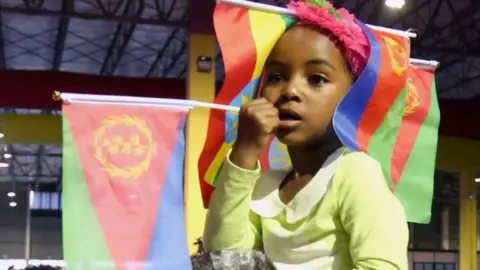 Reuters
ReutersWomen, who make up about half the population of 102.5 million, are largely confined to traditional roles, especially in rural areas where they spend much of their time at home, looking after their children, fetching wood and water from rivers, and weeding and transporting cereals.
- Nearly 25% of women leave most decisions to their husbands
- Almost 50% have experienced violence from a partner
- Less than 20% of girls enrol for secondary education
- More than 40% are married before they turn 18
Against this backdrop, Prime Minister Abiy Ahmed's decision to promote women to powerful posts has been widely welcomed, with rights groups hoping that the new government will follow it up by unveiling major initiatives in the coming months to improve the lives of ordinary women.
Mr Abiy, 42, has given half of the government's 20 ministerial posts to women. This is in contrast to the four posts women held in the much larger cabinet of his predecessor, Hailemariam Dessalegn.
Ethiopia and Rwanda are now the only African states to have equal gender representation in the cabinet.
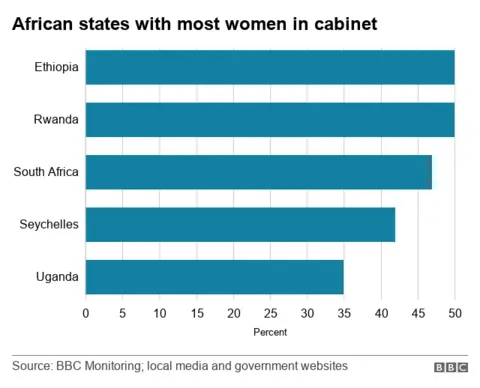
Mr Abiy has also appointed renowned human rights lawyer Meaza Ashenafi - whose efforts to tackle the underage marriage of girls formed the basis of an Angelina Jolie-produced Hollywood film in 2014 - as the country's most senior judge.
In two other moves, communications expert Billene Aster Seyoum has been appointed as the prime minister's press secretary, while former UN official Sahle-Work Zewde was elected by the male-dominated parliament as president.
Tribute to mother
Although Ms Sahle-Work's post is largely ceremonial, she represents Ethiopia at some international events, boosting the profile of women and highlighting the need to increase female representation in other African governments. She is currently Africa's only female head of state.
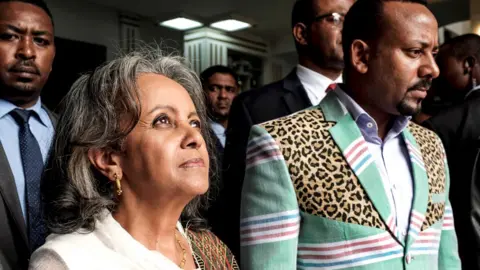 AFP
AFPRediet Kefale - a member of the Yellow movement, which campaigns for the rights of women - told the BBC: "We have never seen women in power like this. It is new to our eyes. Whatever the post, it is a great move to develop women's leadership."
The first hint that Mr Abiy intended to champion women's rights came in his inaugural address as prime minister in April, when he took the unprecedented step of paying tribute to his late mother in parliament.
"My mother is counted among the many kind, innocent, and hardworking Ethiopian mothers... Though she is not alive, I would love to thank her," he said.
"Furthermore, I would love to thank my wife who took my mother's vision to help me and substituted my mother," he added, as the male-majority parliament broke into rapturous applause.
Minister of peace
Furthermore, the nation's - and the prime minister's - security has been placed in the hands of women for the first time, with Mr Abiy giving ex-construction minister Aisha Mohammed the defence portfolio and former parliamentary speaker Muferiat Kamil the newly created peace ministry, which covers the police and the powerful intelligence agencies.
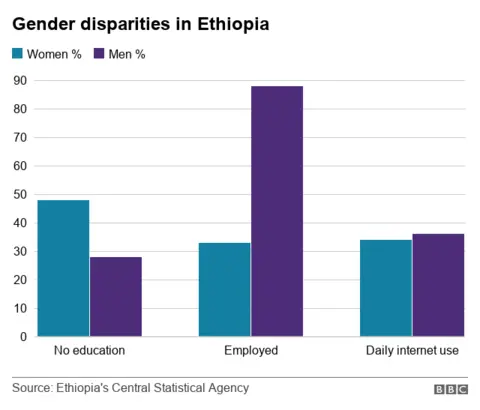
The appointment of the two women is also historic because they are Muslims from minority ethnic groups who have never held such powerful posts before.
Their presence in the cabinet, therefore, helps Mr Abiy - who comes from Ethiopia's largest ethnic group, the Oromo, and was born to a Muslim father and a Christian mother - achieve not only gender parity, but to widen his support base among ethnic minorities and Muslims, who sometimes complain of political marginalisation.
'Less corrupt than men'
Although they do not have a background in the military or police, both women are known to be political heavyweights, with Ms Aisha probably having more clout as she heads one of the four parties which form the ruling coalition, the Ethiopian Peoples' Revolutionary Democratic Front (EPRDF).
Explaining the appointments when he made them last month, Mr Abiy said women were "less corrupt than men" and would help achieve peace - a key challenge for a nation where hundreds of people have lost their lives in ethnic and political violence since 2015.
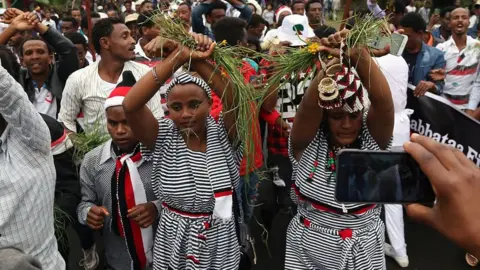 Getty Images
Getty ImagesAnd his reasoning appeared to have become clearer last week when more than 60 officials - including the former head of a military-run business conglomerate and the former deputy head of the national intelligence agency - were arrested amid an investigation into corruption and human rights abuses.
Abeba Gebressilase, who unsuccessfully ran for parliament as an independent in the 2005 election, said she had no doubt that Mr Abiy's decision to give women greater power would pay off.
"Women are always peace-loving and when something that destroys peace happens, it is the mothers who pay,'' she told the BBC.
'No favours to women'
An academic at Ethiopia's Mekelle University, Mekonen Fiseha, said that while he agreed with this view, it was still to be seen whether the female ministers would stand up to Mr Abiy if they had to.
''If the prime minister made the appointments to avoid the challenges he will face from men and to create a 'yes mentality' via women, this will not solve the country's problems,'' he warned.
But Ms Hilina - the gender and law consultant - dismissed such concerns, saying: ''I do not think these women came to power because of Abiy's, society's or the system's generosity. Rather, it is the result of their hard work and endeavour. So, as women, we should not see this as a favour."

Read more about Ethiopia's transformation:

Ms Meaza - the newly appointed head of the federal Supreme Court - is probably the best example of this.
The founder of the Ethiopian Women Lawyers' Association, she is widely recognised for challenging discriminatory laws and putting women's issues on the national agenda.
True story behind Angelina Jolie film
Her biggest success came in the late 1990s when she defended a 14-year-old child bride in court. The girl was accused of killing her "husband" who had abducted and raped her.
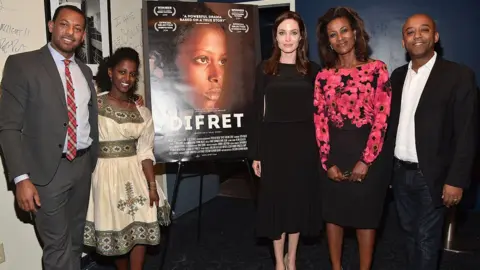 AFP
AFPShe won the case, and it led to Ethiopia outlawing the traditional practice of abducting young girls for marriage. The precedent-setting case gained international attention, and formed the basis of the film Difret (Amharic for courage), which had Angelina Jolie as its executive producer.
Following her appointment, Ms Meaza said: "I am so happy that the glass ceiling is shattered and my daughters can dream of becoming anyone they want to be in Ethiopia.
"I will strive to deliver justice for all. The less empowered people will benefit, especially women," she added.
But a reminder of the scale of the challenges she and the other trailblazing women face came when some men in Ethiopia responded to her appointment by saying "wendata'', in the widely spoken Amharic language.
This is loosely translated as "manly", and is often used to congratulate a woman on her success.
In other words, she's so good, she's like a man.

